
Future-proofing your EU funding strategy for the post-2027 period
Preparing for EU funding for the post-2027 period? Learn what organisations can do now to align with policy shifts, build partnerships and strengthen readiness.
Horizon Europe is the EU’s flagship funding programme for research and Innovation projects and known for its complexity, high standards and strong competition for funding. Successful applicants need to demonstrate a solid alignment with EU priorities and convince the evaluators of the project’s excellence and impact. While this may be intimidating in particular for first time applicants, being aware of the following key factors can enhance your chances of success considerably when preparing your Horizon Europe application.
Horizon Europe is one of the most competitive EU funding programmes, attracting the best research institutions, universities, SMEs as well as big and well-known companies. The success rate is often low and, depending on the individual funding strand, can go down to 10-20%. This means it is possible not to be selected for funding although your project is great and your received score very high. To have a chance of being funded, a thorough preparation of your proposal is decisive.
Most Horizon Europe Calls (in particular the Calls for pillar 2 – Global Challenges and European Industrial Competitiveness) require international cooperation, meaning that applicants must build consortia with other suitable partners. In most cases, you need to ensure that your consortium includes partners (independent legal entities) from at least three different EU member states or associated countries, unless the Call specifies different criteria. Then, how many partners you should have in your consortium (beyond the minimum requirement) depends on your specific project’s goals. Each partner must have clearly defined roles and will need to bring an added value to the consortium.
It will be the coordinator of the project who is in charge of compiling all necessary information and commitments from the other partners. The lead organisation (coordinator) will have to earmark enough time in advance, for example to collect the necessary documents, agreements regarding the distribution of responsibilities between partners and process everything before submitting the application via the EU Funding & Tenders Portal. The coordinator will have significant administrative and, later-on if the project is selected for funding, reporting responsibilities. High-quality Horizon Europe proposals need several and sometimes even more than six months of thorough preparation, especially if a larger number of project partners is involved.
First of all, carefully read the published text of the Call for Proposals and be sure that your project is aligned with the goals stated in the Call. You will also need to read the associated Horizon Europe Work Programme as it gives more information about expected objectives to be reached by the sought projects as well as the evaluation criteria. Also look at the related documents such as in particular the ones on EU policy priorities and strategies within your thematic area which are referred to in the Call text or the relevant Work Programme part. Explain in your application how your project proposal addresses these priorities and strategies.
You will need to explain in your application what the state of the art of your thematic activity is and how your project will bring more value to the table than what is already known and implemented. How is your project different to what is already current practice and/or in how far does your project add an important new perspective or approach to previous efforts in that particular thematic field?
When reading the Call text, don’t overlook the fine print. The exact wording is important. There are some hints in the text what the EU considers must-haves for the to-be-funded projects. When describing your project, don’t leave out any of the specified aspects. If the Call text states that you should address a “and” b in the project, it is a requirement to address both. Only when you address all required elements of the Call you will be able to receive the required high score to be selected for funding. Also, the words “should”, “recommended” and “encouraged” are essential as they indicate what is being expected from sought projects. Given the high competition for funding, an utmost should be done to accommodate as many of these expectations as possible.
The application process requires filling out extensive forms and providing a comprehensive description of the project’s objectives, methodology, expected impacts and work plan. Requirements regarding submission formalities are binding. For example, there is a strict page limit and the formatting for the pages and texts are prescribed too. Although the technical description part has to be uploaded onto the application portal in a separate document, don’t exceed the limit. The system will make excess pages automatically invisible and therefore any given information coming after the page limit won’t be taken into account for the evaluation.
Proposals must break down the project into clear work packages with specific milestones, deliverables and timelines. Applicants need to create a coherent and realistic plan that demonstrates efficient resource allocation and project management.
There are a number of other criteria which need to be addressed and explained in the application form and which may however depend on the kind of project you are planning to implement. For example, Horizon Europe applicants need to demonstrate compliance with ethical guidelines, which may require specialised expertise or additional project planning efforts. Other criteria are covering various aspects of research and innovation to ensure that projects adhere to the highest standards of integrity and respect for human rights, animal welfare, environmental sustainability, data protection and security. Addressing these aspects appropriately is another important component for the success of any proposal.
Successfully applying for a Horizon Europe grant requires a thorough preparation, attention to detail and a good collaboration with your consortium partners. Consortia are required to demonstrate the highest levels of scientific excellence, innovativeness and impact for the proposed project. Begin the process early enough and allocate sufficient time to developing, writing and adapting your proposal.
The preparation of a successful Horizon Europe proposal can be considered both time-consuming and resource-intensive. However, participating in a Horizon Europe project offers newcomers significant benefits, not only access to substantial funding, but also opportunities for international collaboration and an enhanced visibility within the research and innovation community. Newcomers can build valuable networks, gain experience in interdisciplinary projects and enhance their reputation on which they can build in the future.
—
Are you planning to apply for Horizon Europe funding? Check out the new free resource to help you write clear, evaluator-aligned proposals that score higher: Horizon Europe Strategic Proposal Language Toolkit
Need support with your Horizon Europe proposal? Whether you are looking for an expert review, tailored feedback, or full proposal-writing assistance, feel free to get in touch to discuss the best way I can help.

Author: Astrid Mechel
https://eufundingconsulting.eu
Hello, I am Astrid Mechel and I work (for the most part) with small and medium sized organisations who aim to access EU funding. It is my goal to help discovering suitable EU project funding possibilities and to provide support to submit a high-quality grant application. My main thematic focus is on grants for research and innovation, environmental sustainability as well as on social inclusion and participation.
Read more articles here:

Preparing for EU funding for the post-2027 period? Learn what organisations can do now to align with policy shifts, build partnerships and strengthen readiness.

EU project funding for nonprofits: Discover 6 misconceptions that hold organisations back and how to turn them into opportunities for growth and impact.

Applying for EU funding can be a complex and challenging. This article offers 12 practical tips to help you avoid the most common stumbling blocks.
Online Workshop
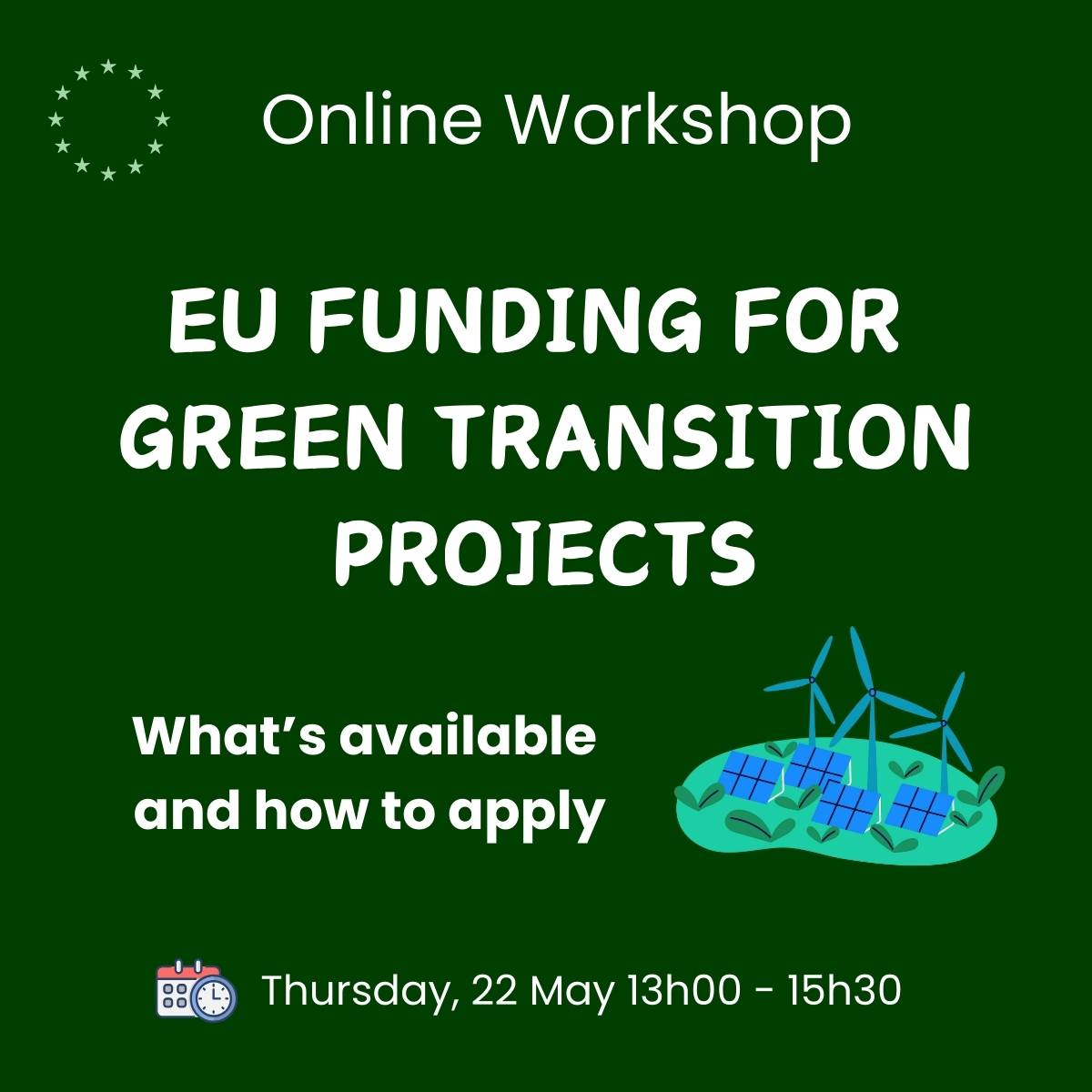
Interactive Live Workshop
On 22 May 2025 from 13h00-15h30
Registrations are closing soon
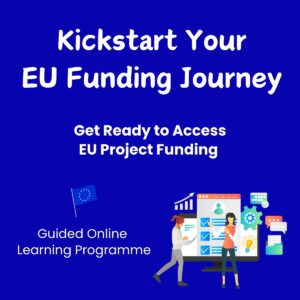
Curious about EU funding and how it could support your next project? Join the new live programme round for a compact and easy-to-follow way to get started with EU funding.
Key Terminologies – Application Guidance
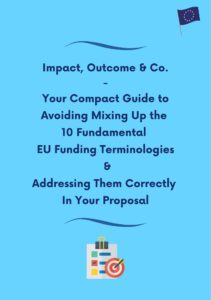
This guidance compares and compare and clarifies the 10 key terminologies within an EU funding application. How should you address them in your proposal, and what kind of information belongs to which one of them?
Online Workshop on 6 November!
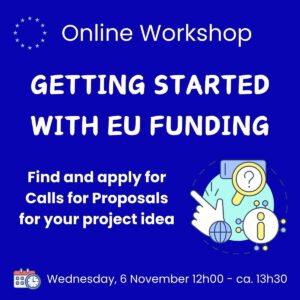
The workshop “Getting Started with EU Funding” is for participants with no or very limited experience in EU funding. Discover what kind of projects the EU is funding, the requirements and how you can apply for funding in your thematic field.
EU Funding Checklist
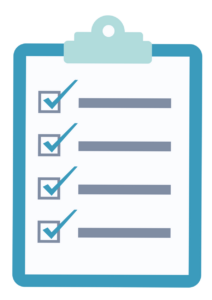
Do you have a new project idea and are wondering if EU funding could be available for your project?
This checklist will guide you through the most important questions to be considered when applying for EU project grants and includes some further suggestions how you could adapt your concept to be more in line with EU expectations regarding fundability.
Get the brand new upgraded guidance booklet (free offer):
Your compact guide on how they work and how your organisation can apply for funding
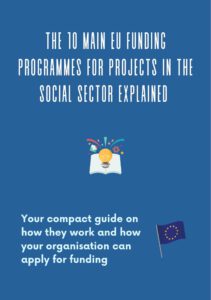
Find out which 10 EU programmes offer grants for projects in the social sector, what the conditions for funding are and how you can apply.
Online Workshop
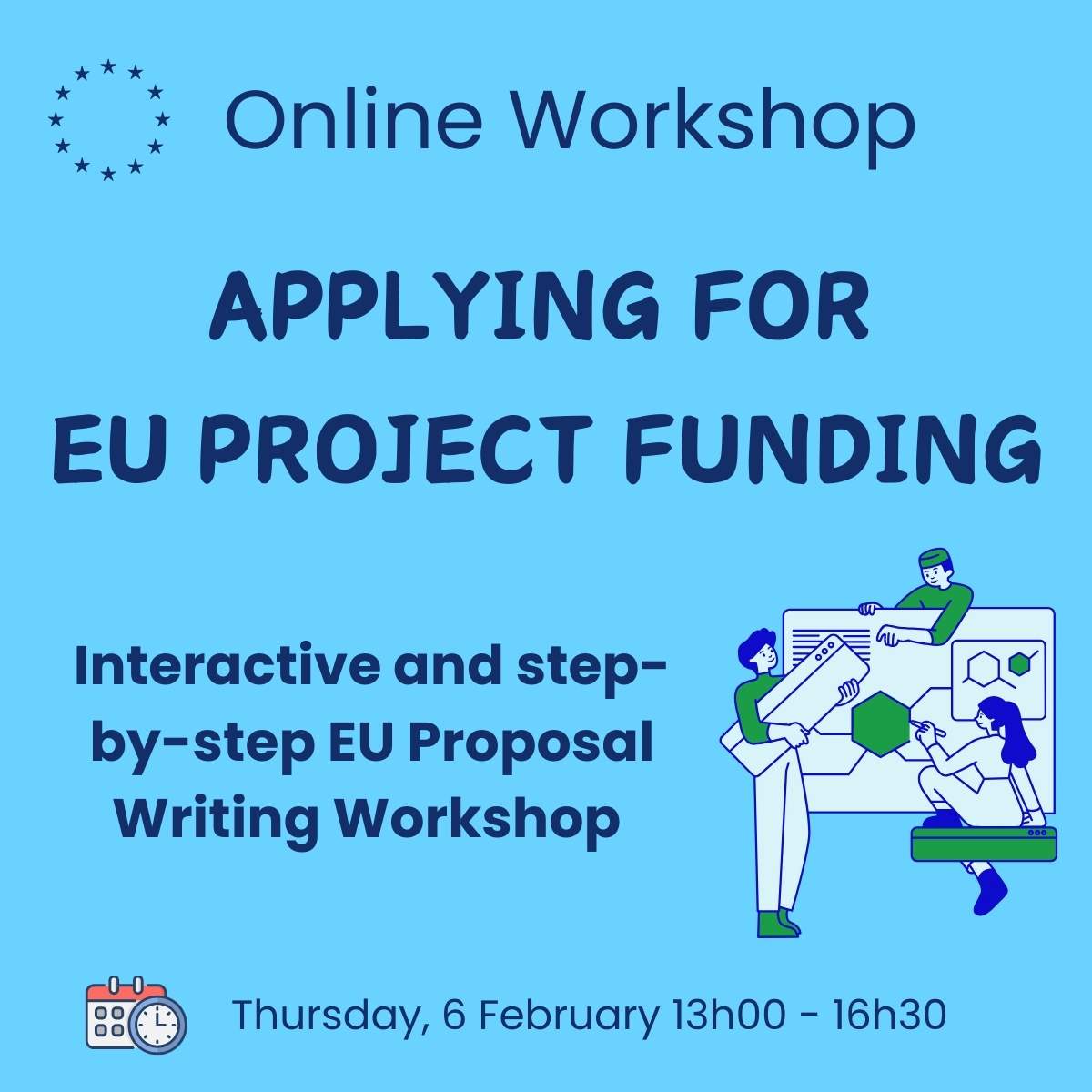
Interactive and step-by-step EU Proposal Writing Workshop
On 6 February 2025 from 13h00-16h30